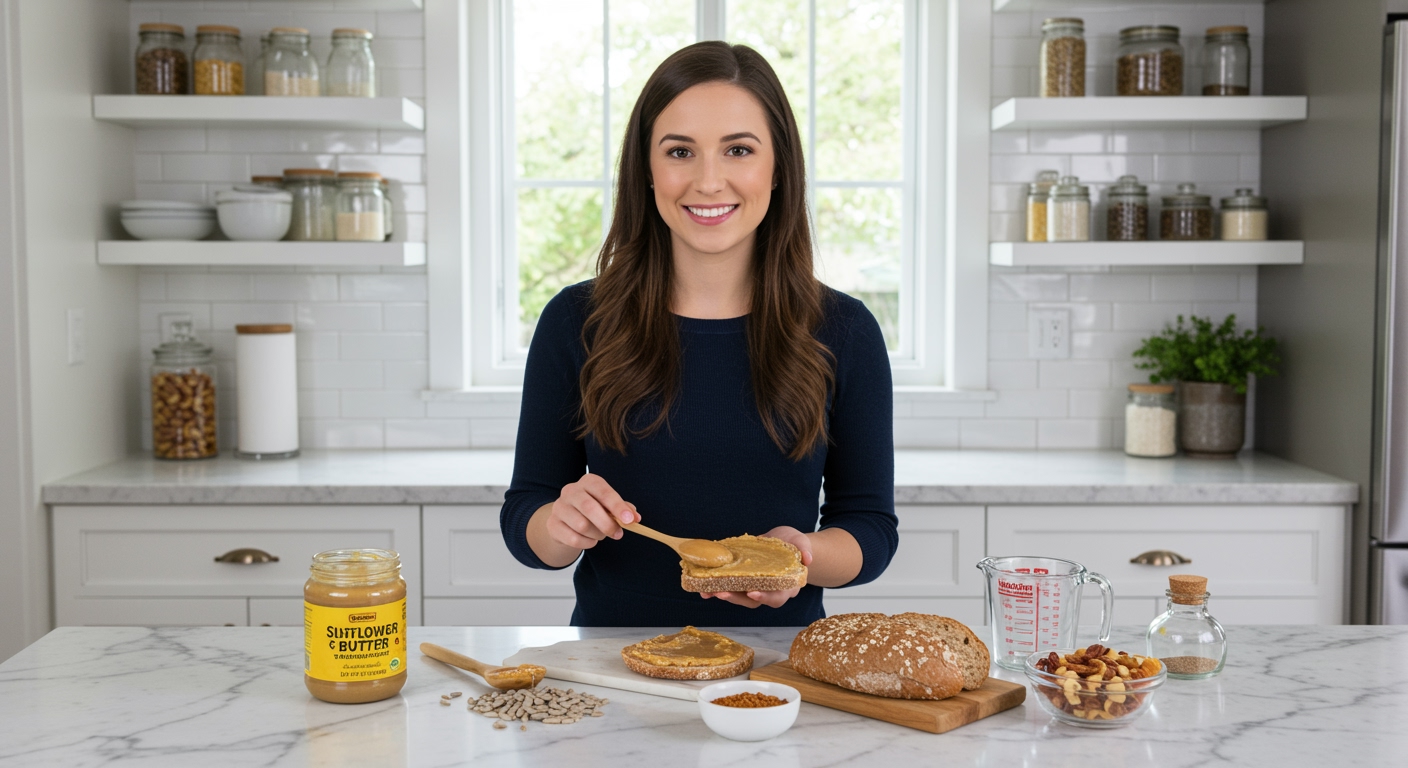✪ Key Takeaway: Sunflower butter supports PCOS management through healthy fats, vitamin E, and magnesium while being lower in inflammatory compounds than peanuts.
Introduction
You walk down the nut butter aisle and wonder if that jar of sunflower butter could actually help your PCOS symptoms.
Many women with PCOS struggle to find foods that support their hormone balance without triggering inflammation or blood sugar spikes.
Hi, I’m Abdur, your nutrition coach and today I’m going to explain exactly how sunflower butter affects PCOS and whether it deserves a spot in your daily routine.
What Makes Sunflower Butter Different From Other Nut Butters?
Sunflower butter comes from sunflower seeds rather than tree nuts, making it naturally free from common allergens.
This seed-based spread contains higher levels of vitamin E than most nut butters, providing powerful antioxidant protection.
The magnesium content in sunflower butter reaches about 325 milligrams per 100 grams, which is significantly higher than peanut butter.
Unlike peanuts, sunflower seeds grow above ground and contain fewer inflammatory compounds that can worsen PCOS symptoms.
The protein profile in sunflower butter provides all essential amino acids your body needs for hormone production.
✪ Fact: Sunflower seeds contain more vitamin E per serving than almonds, walnuts, or hazelnuts combined.
How Does Sunflower Butter Impact Insulin Resistance?
The healthy fats in sunflower butter help slow down sugar absorption and prevent blood glucose spikes.
Magnesium plays a crucial role in insulin sensitivity by helping cells respond better to insulin signals.
Research shows that adequate magnesium intake can improve glucose metabolism in women with PCOS.
The protein content helps stabilize blood sugar levels when eaten with carbohydrates like toast or fruit.
Sunflower butter contains chromium, a trace mineral that enhances insulin function and glucose uptake.
The fiber from ground sunflower seeds adds bulk to meals and slows digestion for better blood sugar control.
✪ Pro Tip: Pair sunflower butter with apple slices or whole grain crackers to maximize blood sugar stability.
Can Sunflower Butter Help With PCOS Weight Management?
The healthy fats in sunflower butter trigger satiety hormones that help you feel full longer.
Two tablespoons provide about 190 calories with 16 grams of fat and 7 grams of protein.
This macronutrient combination helps prevent the hunger spikes that often lead to overeating.
The magnesium content supports proper thyroid function, which is often compromised in women with PCOS.
Unlike processed snacks, sunflower butter provides sustained energy without causing metabolic crashes.
The vitamin E acts as an antioxidant that reduces inflammation linked to weight gain in PCOS patients.
✪ Note: Stick to two tablespoons per serving to avoid excess calories while still getting nutritional benefits.
What About Inflammation And Hormone Balance?
Sunflower butter contains omega-6 fatty acids that your body converts into anti-inflammatory compounds when consumed in moderation.
The vitamin E content helps protect cell membranes from oxidative stress that can worsen PCOS symptoms.
Magnesium supports the production of progesterone, a hormone often deficient in women with PCOS.
Unlike peanuts, sunflower seeds are less likely to contain aflatoxins, which are inflammatory mold toxins.
The zinc content in sunflower butter helps regulate androgen levels and supports healthy skin.
Research suggests that adequate vitamin E intake may help reduce testosterone levels in women with PCOS.
✪ Fact: One serving of sunflower butter provides about 37% of your daily vitamin E needs.
Are There Any Downsides To Consider?
Sunflower butter is calorie-dense, so portion control becomes essential for weight management goals.
Some commercial brands add sugar or oils that can increase inflammation and blood sugar responses.
The high omega-6 content could become problematic if you already consume too many processed foods.
Always check ingredient lists to avoid brands with added sugars, hydrogenated oils, or artificial preservatives.
Some people experience digestive upset when first introducing sunflower butter due to its fiber content.
The natural oils can go rancid quickly, so proper storage in the refrigerator extends shelf life.
✪ Pro Tip: Choose organic, unsweetened sunflower butter with only sunflower seeds and salt in the ingredient list.
The Bottom Line
Sunflower butter can be a valuable addition to a PCOS-friendly diet when consumed mindfully and in appropriate portions.
Smart nutrition choices create lasting health changes, one spoonful at a time.
I would love to hear about your experience with sunflower butter or any questions you might have about incorporating it into your PCOS management plan in the comments below.
References
At NutritionCrown, we use quality and credible sources to ensure our content is accurate and trustworthy. Below are the sources referenced in writing this article:
- PMC: Sunflower Seed Nutritional Benefits
- Allara Health: Seed Cycling PCOS
- USDA: Sunflower Almond Butter Research
- Wiley Online Library: Sunflower Seed Health Effects





